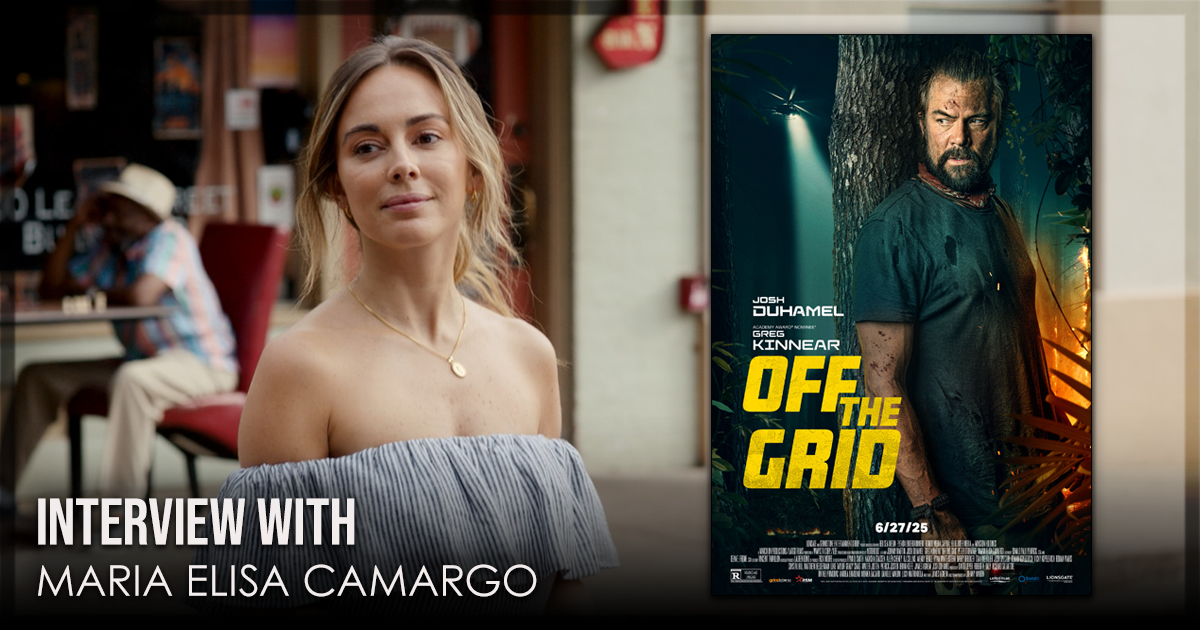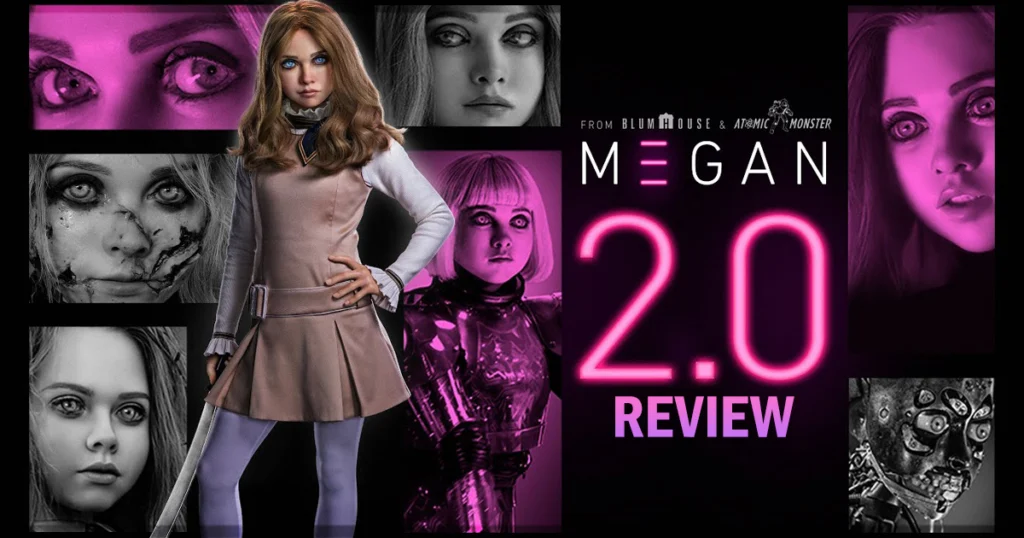Maria Elisa Camargo is a name well-known to fans of The X Factor Colombia, video games, and telenovelas. She’s a talented actress who has voiced Valeria Garza in the Call of Duty: Modern Warfare franchise and had a ton of high-profile roles on international and Spanish-language hits, from Escupiré sobre sus tumbas to Bajo el mismo cielo and En otra pie. Off the Grid, a high-stakes action film where a rugged scientist goes, well, off the grid to protect humanity from a morally bankrupt corporation that wants to weaponize his inventions, is Camargo’s Hollywood debut.
Over Zoom, the actress shed light on the world of Off the Grid and her character, Josey. Not only did she discuss the highs and lows of landing the role, but she also shared her surprising initial vision for the character, a Mississippi local complete with a southern accent, and how it evolved into the Latina woman we see in the film. Camargo chatted about being on set and how wonderful it was to work with Josh Duhamel and Greg Kinnear, as well as how she felt supported by director Johnny Martin and more. Read ahead for the full interview and then check out the film.
The Interview with Maria Elisa Camargo on Off the Grid
[Editor’s Note: This interview has been lightly edited for clarity.]
Ayla Ruby: I’d love to know, can you kind of talk about your journey to this film, how you got on board, and what drew you to Josey?
María Elisa Camargo: Okay. So it was a crazy adventure. Hopefully I can make it quick because I know we have limited time, but the audition happened during the actors’ strike, and it was one of the lowest moments in my life because I couldn’t leave the country. I was in the middle of getting my citizenship, so I was kind of going through another pandemic. Stuck in a country that wouldn’t give me work. And I had finished paying for this investment thing.
So I had zero… It was the least abundant moment of my life. And then I had this audition, and the names Greg Kinnear and Josh Duhamel were already linked to the project, so I thought, “This is going to be the most aggressively fought-for project ever,” because people are… This had the interim agreement permission to be done within the strike. So obviously you think possibilities are even lower when you have big names and you’re in the middle of a strike.
Hence, I gave it 300%, even though I was in Miami, I didn’t have a partner. I had to make up the replies. I didn’t have anyone to read for me, so I just read in silence and I just reacted to silence. It was all done in the craziest way, but then I got accepted. I got the role. But then it was a year later that we finally shot the movie, and there were so many changes because after the strike was over, all the projects that were chronologically in order for the other actors, including Josh, had priority now.
So we had to wait for him to finish, I think it’s Ransom Canyon, this other project that aired on Netflix. Thank God I had a different project, a Hispanic project, so I wasn’t so anxious, but still I was, because it’s the most important role of my life. It’s finally my crossover project. I was very anxious about it and I started hearing that it was no longer going to be shot in Italy nor Spain. And then it changed to Mississippi, and I am Latina and they chose me because of that. So they almost got rid of me, to be honest.
I was backed up and I was so thrilled to have Johnny Martin beside me, supporting me, because he really loved my work. I even went to the point of learning Southern accent, and my American accent isn’t even 100%, so imagine for me to be able to do an accent that even Americans struggle with when they’re trying to speak in that dialect.
It was so funny because in the end, when I met Josh and I told him I was Latina, he was like, “Then why are you doing a Southern accent?” I’m like, “Because you’re in Mississippi. You’re off the grid and you find a local girl,” et cetera. And they were like, “No, we actually want you Latina,” last minute. So I had to make up a character from scratch. Well, obviously, within my realms of comfort, but it was a crazy adventure.
Ayla Ruby: Well, I have a question about that. So Josey has some really big moments of peril there, in the bar where she’s being threatened by Greg Kinnear’s character, and she’s got a gun to her chin. How do you prepare for that as an actress? How do you get into that space? What’s the deal there?
María Elisa Camargo: I’ve been doing novellas and large, chunky and super emotional Latino stories for 12 years, so I think I’ve learned to develop this set of tools that allows me to kind of tap into an emotion as quickly as possible. In this case, if anything, it was easier for me because we had more time to develop these emotions we have. I’m so happy to be doing three or maximum four scenes per day, because we can focus the same 12-hours work days. I mean, it’s still super intense, but you can focus on one or a couple of scenes per day, so you can give them different options.
And it can start, since you haven’t really warmed up, it can start being a more internal type of “not to”, because I didn’t want to go, especially since I do it, I didn’t want it to be like a soapy acting. I wanted it to be as natural, and even as contained as possible, because I feel like, if this is a Latina that had to run away from whatever reality, and I kind of take it she’s undocumented, that’s why she ended up there.
So she has to be hiding stuff, and almost in the same way that there’s a mystique and there’s something mysterious about Josh’s character. So it started like that, but then I gave them a lot of options because I have the chance. I connect with music a lot. I am kind of method. My acting has to… I don’t have a lot of bad memories, so I can’t really go to Stanislavski and remember times when I felt that level of anxiety.
I kind of go to the method, to the feelings of the [character] and the emotions of the character. So it was interesting to have… I usually have to connect so quick and I already, I don’t know, developed something in me like breathing techniques and especially music. But now when I had that much more time to give them different options, I think I did this crescendo of possibilities, and then they chose one somewhere in the spectrum according to their storytelling. But I had enough time and enough support and patience to give them everything to the point that I wasn’t frustrated of a what if, right?
Ayla Ruby: Well, that’s wonderful. I know we’re close on time. What was the most challenging or most gratifying, professionally, thing that you did in this film? And is there anything else you want people to know about it?
María Elisa Camargo: Well, to me, the most gratifying was to find myself in my first ever Hollywood movie and everybody being so immensely kind and human. I thought it was going to be a lot… I don’t know if darker, but definitely colder. And it was just the most beautiful human beings I’ve surrounded myself with in my whole career, starting with Johnny Martin, the director, and then Greg was amazing. Josh was, oh, my God, a delight. Everyone was so generous.
And my biggest challenge had to do with improvising. I’d done it before. Spanish is my first language, not English. This was a Latino character, but it was still English. And out of nowhere I had created this Mississippi character that I was so concerned with because of the accent, and I was losing the magic of the character just to focus on that.
When they gave me these wings to create a Latino character with a thicker accent than I have actually, it all became about Johnny telling me, last minute, on the spot, just, “Oh, by the way, you’re not just going to say these couple of lines. You have all this block of walking for you to tell, in this case the character, but also the audience, why are you a Latina in Mississippi. Three, two, one.”
And it was just like that, on the spot having to make up these things. A lot of them were kept, A lot of the Spanish-speaking is also improvised. So there was a lot of just… I had to prove myself that I had the experience to have that level of speed to improvise, and that’s what I loved the most. It gave me a stronger tool to work with.
Ayla Ruby: Oh, that’s awesome. And again, it was lovely. And thank you so much for taking the time to talk with me.
María Elisa Camargo: Of course. Thank you so much for the support and for the space you’re giving me.
Off the Grid is now available on digital and on demand.
Learn more about the film at the IMDB site for the title.
You might also like…
‘M3GAN 2.0’ Movie Review: Still A Little Life in Her Yet


